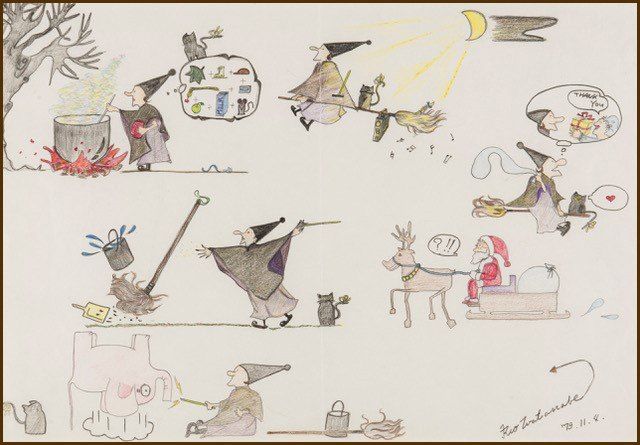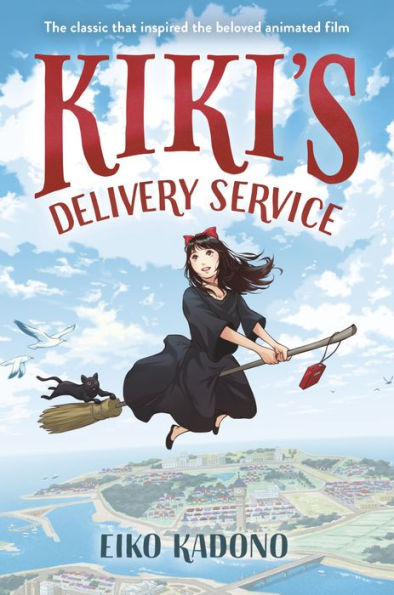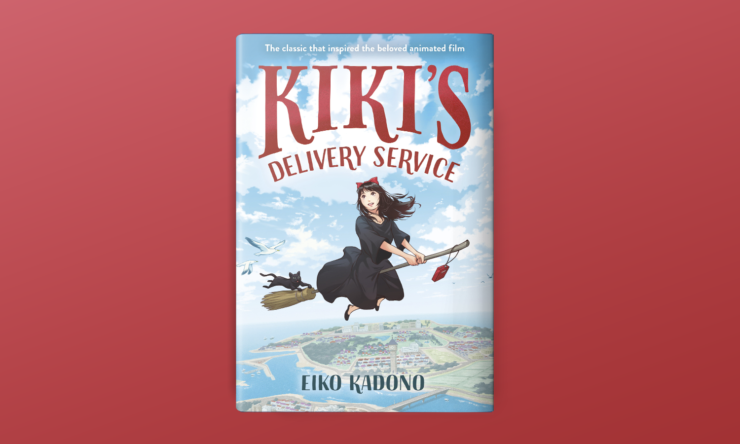If you’re like me, the ongoing state of the world has meant a retreat into old childhood classics. The anime Kiki’s Delivery Service, a perennial favorite, has been a particularly refreshing escape: a young witch flying around the gorgeously illustrated countryside with the help of her cat Jiji, meeting kindly people and making friends wherever she goes. It’s a classic film inspired by a classic novel—one that’s just been translated into English for a new edition, released earlier this month.
Recently, I had the opportunity to interview Kiki’s Delivery Service author Eiko Kadono, and her translator Emily Balistrieri. We discuss Kadono’s original inspiration for Kiki, what it feels like to return to a book thirty-five years after publication, and the challenges of translating such a beloved children’s book from Japanese to English.
A lot of American readers know Kiki’s Delivery Service from the Studio Ghibli film. Could you talk a bit about what the adaptation process was like for you? Were you involved in writing the script, or in the production of the film at all?
Eiko: I basically believe that whenever something is made into a movie or play, it becomes a different work from the original. In a movie, the pictures are in constant motion, and on the stage, the actors move. It’s only natural that those works would be different from the original, and I understand that. But at the time, I asked that the title and the story’s world view be kept and that Kiki’s personality also align with how she is in the novel. That’s about the only participation I had in the movie. After that, I just looked forward to the finished product.
You mention in your introduction that a drawing of your daughter’s inspired the novel. Can you talk a little about that inspiration, and what story it made you want to tell?
Eiko: My daughter drew some images from [or depicting] the life of a witch. One of them was a witch flying with a black cat on a broom. What I found interesting was the radio hanging from the broomstick. I thought, It would probably feel great to fly along listening to something like “The Long and Winding Road” by The Beatles. At the time, my daughter was 12, so I thought I’d make the girl in the story the same age. (I’m including my daughter Rio’s pictures.)

Did you have any worries or concerns about having your book adapted into a movie? Does having your book translated into another language feel similar or is it a completely different experience?
Eiko: Unfortunately, I’m not very good at English. I can read a little bit, but I can’t get the full meaning behind the words. So I just waited for it to be finished without worrying too much.
What does it feel like revisiting one of your first books, thirty-five years after it’s first publication?
Eiko: Kiki’s Delivery Service is such a joyful book. It was made into a movie by the world-famous Hayao Miyazaki, and it was adapted as a play by Yukio Ninagawa. People all around the world love Kiki and Jiji. It was published 35 years ago, but because it continues to be read, I always feel like I’m encountering it anew as a first edition.
Buy the Book


Kiki’s Delivery Service
Is there anything you’d like to say to your new American readers?
Eiko: Finally the day people in America can read Kiki’s Delivery Service has arrived. Kiki, Jiji, and I are all very happy. Please think of us as your friends.
The world is facing a lot of complicated problems right now. I think that makes it an era when each person has to use their imagination and think about things in their own words. Please read books to acquire your own words. Enjoy the stories. As you do that, a dictionary of your very own will grow inside you. And I believe that dictionary will enrich your life.
What are you working on now?
Eiko: Right now, I’m writing a story about a girl called Keke who appears in the third volume of the Kiki’s Delivery Service series. She can only ever see half of the moon. Why is that? The title is “Half Witch.” I’ll be finishing that soon. Next I’ll be writing about how a girl spends her liberated days after the [second world] war ends and how she grows up during that time… It’s half autobiographical.
A question for you both: why did you want to do a new translation of Kiki’s Delivery Service now?
Eiko: There’s only one reason: because I’d like to have as many people read it as possible. In Japan, it has been read by four generations. Now that Kiki has been translated into English again, the world she can fly through has expanded. I have high hopes.
Emily: I was brought on after the project was already decided, but I would imagine that a big reason for it was that Eiko Kadono was awarded the 2018 Hans Christian Andersen Award for Writing, which is sometimes called the Nobel Prize of children’s literature. I’d like to think of it as a chance to hopefully get the entire series out, but that will depend on a lot of things I don’t have control over!
What drew you to this project?
Emily: I mean, have you seen the movie? Haha, no, it’s not only that (although I have especially fond memories of the English end-credit song). In addition to being an incredible honor to translate such a beloved story and important author, it’s also a special career milestone for me to finally have a children’s book published. I’ve translated around 200 picture books (samples for promotional purposes) as well as samples of various chapter books, but until now I haven’t really had something I did for kids make it out into the world. I turn 35 this month (the same age as the book, I realized), and it’s so fun to hear from friends that their daughters are reading or will be getting it for their birthday. (Please also buy it for your sons!)
What are the challenges of translating from Japanese, especially to a modern English-speaking audience?
Emily: Well, where to begin! Sometimes it’s the obviously tricky things like wordplay. For instance, there’s one chapter where Kiki talks about a poem she wrote. “Shoes laugh tap-tap-tap. / Hats laugh tip-tip-tip. / I laugh tee-hee-hee.” In Japanese, the shoes laugh “kutsu-kutsu” (the sound of stifled laughter) and kutsu is the word for shoes; the hats laugh “kaburu-kaburu,” and kaburu is the verb for wearing something on your head. And the “I laugh” line at the end is literally more like, “How funny, I laugh,” but in Japanese, the words “I’ and “funny” have a similar sound. I decided to keep the sound, verb feeling for the first two and tie the three lines together as a poem with alliteration and a proper “laugh” at the end.
Other times, the challenges are more nebulous. How to keep the same sort of momentum without ending up with an unwieldy run-on sentence, how to portray characters when the ways they talk are sometimes specific to Japanese (for instance, there’s a character in Kugane Maruyama’s Overlord who puts on this Edo-period woman-of-the-night front until she gets upset and then screams in more casual language), things like that.
Are there any other Japanese-to-English fantasy books that you think are great translations?
Emily: The second half of The Beast Player, The Beast Warrior, is coming out this month! Author Nahoko Uehashi is another Hans Christian Andersen Award winner, and the translator is Cathy Hirano, who should probably be a household name. So that’s definitely something to look forward to. I’d also recommend Kanata Yanagino’s The Faraway Paladin, translated by James Rushton. I’ve only read the first volume so far, but I really liked the fresh-feeling magic system and am curious to know where else the story goes.
* * *
The English translation of Kiki’s Delivery Service is available from Delacorte Books.
Eiko Kadono has published nearly two hundred original works and received many accolades, including but not limited to the Hans Christian Andersen Award and a place on the IBBY Honor List for Kiki’s Delivery Service. She lives in the Kanagawa prefecture of Japan.
Emily Balistrieri (he/him) is an American translator based in Tokyo. In addition to Eiko Kadono’s Kiki’s Delivery Service, projects include The Night is Short, Walk on Girl by Tomihiko Morimi, JK Haru is a Sex Worker in Another World by Ko Hiratori, and The Refugees’ Daughter by Takuji Ichikawa. He also translates two ongoing light novels series, Kugane Maruyma’s Overlord and Carlo Zen’s The Saga of Tanya the Evil. Follow him on Twitter: @tiger.










